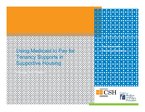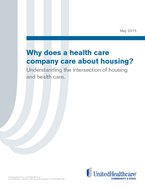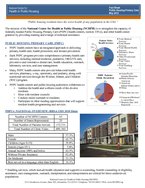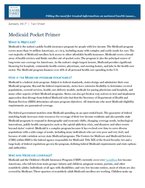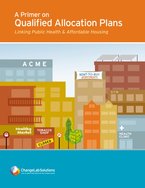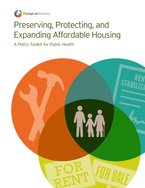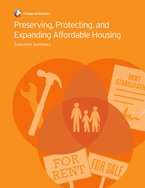0
Policy Brief
Community:
Jan 30, 2019
Under the continuing resolution (CR) that provided the funding to reopen the government for three weeks, SNAP (food stamps) now is fully funded at least through March, even if the government shuts down again on February 15. Millions of families, however, face a longer-than-usual gap between their February and March benefits because the Agriculture Department worked with states to issue February benefits early during the shutdown, and that could further strain household budgets, the emergency food network, and other community resources.
Authored by: Dottie Rensbaum for The Center on Budget and Policy Priorities
Topics: Food insecurity, Funding, Health, Legislation & Policy, Low-income, Nutrition
 Shared by Mica O'Brien
Shared by Mica O'Brien
Mica O'Brien posted a
on Jan 30, 2019
Dottie Rensbaum for The Center on Budget and Policy Priorities
Under the continuing resolution (CR) that provided the funding to reopen the government for three weeks, SNAP (food stamps) now is fully funded at least through March, even if the government shuts down again on February 15.
0
Interactive
Community:
This initiative is generating innovative ideas that will help us address the affordable housing crisis in America and further support our broad mission to create housing opportunities that are safe, sustainable, and affordable, while managing risk to protect lenders, homeowners, and taxpayers.
Specifically, The Challenge is a $10 million commitment by Fannie Mae to generate affordable housing solutions that will help Fannie Mae address the nation’s affordable housing issues by advancing sustainable communities–those providing residents integrated opportunities for employment, health and wellness, and education.
Authored by: Fannie Mae
Topics: Education, Funding, Health, Housing, Low-income, Workforce development
 Shared by Mica O'Brien
Shared by Mica O'Brien
Mica O'Brien posted a
on Oct 10, 2018
This initiative is generating innovative ideas that will help us address the affordable housing crisis in America and further support our broad mission to create housing opportunities that are safe, sustainable, and affordable, while managing risk to protect lenders, homeowners, and taxpayers.
Sp
0
Policy Brief
Community:
Aug 9, 2018
Partnerships between medicaid and supportive housing providers
Authored by:
Topics: Cost effectiveness, Funding, Health, Legislation & Policy, Low-income, Medicaid / Medicare, Partnerships, Supportive housing
 Shared by Housing Is
Shared by Housing Is
Housing Is posted a
on Aug 9, 2018
Partnerships between medicaid and supportive housing providers
0
Policy Brief
Community:
Aug 9, 2018
In a post health care reform era, Medicaid programs need to build system capacity to effectively manage increasingly complex Medicaid populations while simultaneously seeking innovative solutions to reduce costs and improve access. As states are increasingly becoming more reliant upon managed care for complex populations – such as individuals in need of long-term services and supports, those with intellectual or developmental disabilities, individuals with severe and persistent mental illness, as well as children with special health care needs – the needs of these populations range far beyond traditional health care.
Authored by:
Topics: Funding, Health, Housing, Low-income, Medicaid / Medicare, Partnerships
 Shared by Housing Is
Shared by Housing Is
Housing Is posted a
on Aug 9, 2018
In a post health care reform era, Medicaid programs need to build system capacity to effectively manage increasingly complex Medicaid populations while simultaneously seeking innovative solutions to reduce costs and improve access.
0
Policy Brief
Community:
Jul 23, 2018
Public Housing Primary Care (PHPC) health centers have an integrated approach to delivering primary health care, health promotion, and disease prevention. PHPC health centers work closely with public housing authorities to address the health and wellness needs of the diverse residents.
Authored by:
Topics: Funding, Health, Housing, Low-income, Mental health, Partnerships, Place-based
 Shared by Housing Is
Shared by Housing Is
Housing Is posted a
on Jul 23, 2018
Public Housing Primary Care (PHPC) health centers have an integrated approach to delivering primary health care, health promotion, and disease prevention. PHPC health centers work closely with public housing authorities to address the health and wellness needs of the diverse residents.
0
Interactive
Community:
Jul 20, 2018
Kaiser Permanente NW Community Benefit intends to award at least $1.5 million in community grants to support organizations that help people with behavioral health challenges to secure and maintain safe, stable housing. A minimum of five grants of up to $325,000 will be awarded for projects lasting 3 ½ years. Projects must include the involvement of peers or community health workers (CHWs) and must involve collaboration between housing providers, health care providers (including behavioral health service providers) and those community organizations employing peers or CHWs.
Authored by:
Topics: Funding, Health, Homelessness, Housing, Mental health, Pacific Northwest, Partnerships, Place-based, Preventative care, Substance abuse
 Shared by Housing Is
Shared by Housing Is
Housing Is posted a
on Jul 20, 2018
Kaiser Permanente NW Community Benefit intends to award at least $1.5 million in community grants to support organizations that help people with behavioral health challenges to secure and maintain safe, stable housing.
0
Policy Brief
Community:
Jul 19, 2018
While links between housing deficiencies and health conditions are well substantiated, research evaluating the health benefits of specific interventions has been limited. There is, however, some evidence that multifaceted interventions may lead to improvements in health of children and families, as well as to reduced use of medical services.
Authored by:
Topics: Community development, Funding, Health, Healthy homes, Medicaid / Medicare, Seniors
 Shared by Housing Is
Shared by Housing Is
Housing Is posted a
on Jul 19, 2018
While links between housing deficiencies and health conditions are well substantiated, research evaluating the health benefits of specific interventions has been limited.
0
Policy Brief
Community:
Jul 17, 2018
Medicaid is the nation’s public health insurance program for people with low income. The Medicaid program covers more than 70 million Americans, or 1 in 5, including many with complex and costly needs for care. The vast majority of Medicaid enrollees lack access to other affordable health insurance. Medicaid covers a broad array of health services and limits enrollee out-of-pocket costs. The program is also the principal source of long-term care coverage for Americans. As the nation’s single largest insurer, Medicaid provides significant financing for hospitals, community health centers, physicians, and nursing homes, and jobs in the health care sector. The Medicaid program finances over 16% of all personal health care spending in the U.S.
Authored by:
Topics: Affordable Care Act, Funding, Health, Legislation & Policy, Low-income, Medicaid / Medicare
 Shared by Housing Is
Shared by Housing Is
Housing Is posted a
on Jul 17, 2018
Medicaid is the nation’s public health insurance program for people with low income. The Medicaid program covers more than 70 million Americans, or 1 in 5, including many with complex and costly needs for care.
0
Policy Brief
Community:
Jul 13, 2018
This report is intended to help public health advocates and policymakers formulate input into the QAP process, with the objective of developing healthier homes. We describe the rationale for including a wide range of public health-related criteria in QAPs, identify and describe QAP criteria that can have a positive impact on public health, and suggest how public health advocates can get involved in revising their state QAPs.
Authored by:
Topics: Exercise, Funding, Health, Legislation & Policy, Low-income, Place-based, Safety, Smoke-free
 Shared by Housing Is
Shared by Housing Is
Housing Is posted a
on Jul 13, 2018
This report is intended to help public health advocates and policymakers formulate input into the QAP process, with the objective of developing healthier homes.
0
Policy Brief
Community:
Jul 13, 2018
Practitioners and community advocates working at the intersection of housing and health have a unique role to play, both in guaranteeing quality affordable housing remains available for people of all incomes, and in making sure new investments in neighborhoods contribute to a healthy environment. To support those efforts, this guide includes the following: An overview of how renewed interest in urban centers is affecting housing affordability; A summary of the research linking rising housing costs to poor health outcomes; A set of key recommendations communities should consider as part of an overall approach to preserving, protecting, and enhancing affordable housing; and A library of local housing policies and strategies that communities can use to ensure the availability of affordable housing options, with a particular focus on rental affordability.
Authored by:
Topics: Funding, Health, Homelessness, Housing, Legislation & Policy, Low-income, RAD, Safety
 Shared by Housing Is
Shared by Housing Is
Housing Is posted a
on Jul 13, 2018
Practitioners and community advocates working at the intersection of housing and health have a unique role to play, both in guaranteeing quality affordable housing remains available for people of all incomes, and in making sure new investments in neighborhoods contribute to a healthy environment.
0
Policy Brief
Community:
Jul 13, 2018
The tools and strategies included here provide communities with ideas and inspiration to help them plan for healthy housing for all their residents. They include best practices culled from across the United States as well as new ideas.
Authored by:
Topics: Funding, Health, Homelessness, Housing, Legislation & Policy, Low-income, Racial inequalities, RAD
 Shared by Housing Is
Shared by Housing Is
Housing Is posted a
on Jul 13, 2018
The tools and strategies included here provide communities with ideas and inspiration to help them plan for healthy housing for all their residents. They include best practices culled from across the United States as well as new ideas.
0
Policy Brief
Community:
Jul 10, 2018
This brief explores how state Medicaid agencies have utilized a variety of federal authorities and delivery systems to increase access to supportive housing services and highlights important implementation considerations.
Authored by:
Topics: Cost effectiveness, Criminal justice, Data sharing, Funding, Health, Healthy homes, Homelessness, Housing, Legislation & Policy, Low-income, Medicaid / Medicare, Mental health, Partnerships, Substance abuse, Supportive housing
 Shared by Housing Is
Shared by Housing Is
Housing Is posted a
on Jul 10, 2018
This brief explores how state Medicaid agencies have utilized a variety of federal authorities and delivery systems to increase access to supportive housing services and highlights important implementation considerations.
0
Policy Brief
Community:
Jul 10, 2018
This brief provides an overview of current federal standards and state options in Medicaid to help inform upcoming debates about increasing state flexibility in the program as part of efforts to restructure Medicaid financing.
Authored by:
Topics: Affordable Care Act, Cost effectiveness, Funding, Health, Legislation & Policy, Low-income, Medicaid / Medicare
 Shared by Housing Is
Shared by Housing Is
Housing Is posted a
on Jul 10, 2018
This brief provides an overview of current federal standards and state options in Medicaid to help inform upcoming debates about increasing state flexibility in the program as part of efforts to restructure Medicaid financing.
 Shared by Housing Is
on Aug 9, 2018
Shared by Housing Is
on Aug 9, 2018
 Shared by Housing Is
on Aug 9, 2018
Shared by Housing Is
on Aug 9, 2018
 Shared by Housing Is
on Jul 23, 2018
Shared by Housing Is
on Jul 23, 2018
 Shared by Housing Is
on Jul 20, 2018
Shared by Housing Is
on Jul 20, 2018
 Shared by Housing Is
on Jul 19, 2018
Shared by Housing Is
on Jul 19, 2018
 Shared by Housing Is
on Jul 17, 2018
Shared by Housing Is
on Jul 17, 2018
 Shared by Housing Is
on Jul 13, 2018
Shared by Housing Is
on Jul 13, 2018
 Shared by Housing Is
on Jul 13, 2018
Shared by Housing Is
on Jul 13, 2018
 Shared by Housing Is
on Jul 13, 2018
Shared by Housing Is
on Jul 13, 2018
 Shared by Housing Is
on Jul 10, 2018
Shared by Housing Is
on Jul 10, 2018
 Shared by Housing Is
on Jul 10, 2018
Shared by Housing Is
on Jul 10, 2018




